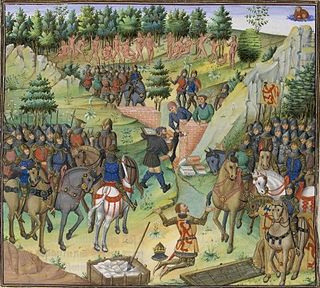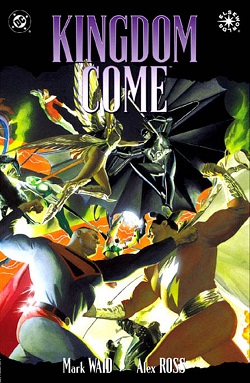See also
- Gog Magog Hills, a range of hills south of Cambridge, England
- Gog (disambiguation)
Magog may refer to:
Rock most often refers to:

Gog and Magog or Ya'juj and Ma'juj are a pair of names that appear in the Bible and the Qur'an, variously ascribed to individuals, tribes, or lands. In Ezekiel 38, Gog is an individual and Magog is his land. By the time of the New Testament's Revelation 20, Jewish tradition had long since changed Ezekiel's "Gog from Magog" into "Gog and Magog".
Asylum may refer to:
Haven or The Haven may refer to:

Kingdom Come is a four-issue comic book miniseries published in 1996 by DC Comics under their Elseworlds imprint. It was written by Mark Waid and painted in gouache by Alex Ross, who also developed the concept from an original idea.

Magog is a city in southeastern Quebec, Canada, about 120 kilometres (75 mi) east of Montreal at the confluence of Lake Memphremagog—after which the city was named—with the Rivière aux Cerises and the Magog River. It is a major centre and industrial city in the Regional County Municipality of Memphremagog. The city lies in the Eastern Townships tourist region.
Noir is the French word for black. It may also refer to:

Magog is the second of the seven sons of Japheth mentioned in the Table of Nations in Genesis 10.
Kilkenny is a city, the county seat of County Kilkenny, Ireland.

Dhu al-Qarnayn, appears in the Qur'an, Surah al-Kahf (18), Ayahs 83–101, as one who travels to the east and west and sets up a barrier between a certain people and Gog and Magog. Elsewhere, the Qur'an tells how the end of the world will be signaled by the release of Gog and Magog from behind the barrier. Other apocalyptic writings predict that their destruction by God in a single night will usher in the Day of Resurrection.

Wandlebury Hill is a peak in the Gog Magog Hills, a ridge of low chalk hills extending for several miles to the southeast of Cambridge, England. The underlying rock is present in a number of places on the hill. At 74 metres (243 ft) it is the same height as the nearby Little Trees Hill, although the latter is a more notable landmark.

The Gog Magog Hills are a range of low chalk hills, extending for several miles to the southeast of Cambridge in England. The highest points are either side of the A1307 Babraham Road, and are marked on Ordnance Survey 1:25000 maps as "Telegraph Clump" at 75 m (246 ft), Little Trees Hill and Wandlebury Hill, both at 74 m (243 ft). The area as a whole is undefined but is roughly the elevated area lying north west of the 41 m (135 ft) col at Worsted Lodge.
Gog may refer to:

Mangog is a character appearing in American comic books published by Marvel Comics.

Magog is a fictional character appearing in comic books published by DC Comics, generally as an enemy and foil to Superman. He first appeared in Kingdom Come #1, and was created by Mark Waid and Alex Ross. In 2009, Magog was ranked as IGN's 75th-greatest comic book villain of all time.

The Superman of Kingdom Come is a fictional character, an alternate version of Superman in the DC Comics universe. First introduced in Kingdom Come #1, Kingdom Come Superman was created by Mark Waid and Alex Ross. The character was loosely adapted in the Arrowverse crossover "Crisis on Infinite Earths", portrayed by Brandon Routh.
Gogmagog may refer to:

Gogmagog was a legendary giant in Welsh and later English mythology. According to Geoffrey of Monmouth's Historia Regum Britanniae, he was a giant inhabitant of Albion, thrown off a cliff during a wrestling match with Corineus. Gogmagog was the last of the Giants found by Brutus and his men inhabiting the land of Albion.
The Oaks of Avalon is the collective name given to a pair of ancient oak trees, Gog and Magog, that stand in Glastonbury in Somerset, South West England. The trees were named after the ancient apocalyptic figures Gog and Magog.
The Syriac Alexander Legend, is a Syriac legendary account of the exploits of Alexander the Great composed in the sixth or seventh century. For the first time in this text, the motifs of Gates of Alexander, an apocalyptic incursion, and the barbarian tribes of Gog and Magog are fused into a single narrative. The Legend would go on to influence Syriac literature about Alexander, like in the Song of Alexander. It would also exert a strong influence on subsequent apocalyptic literature, like the Apocalypse of Pseudo-Methodius composed in the late seventh century. In Quranic studies, the representation of Alexander in the Legend is also seen as closely related to the Quranic figure named Dhu al-Qarnayn.